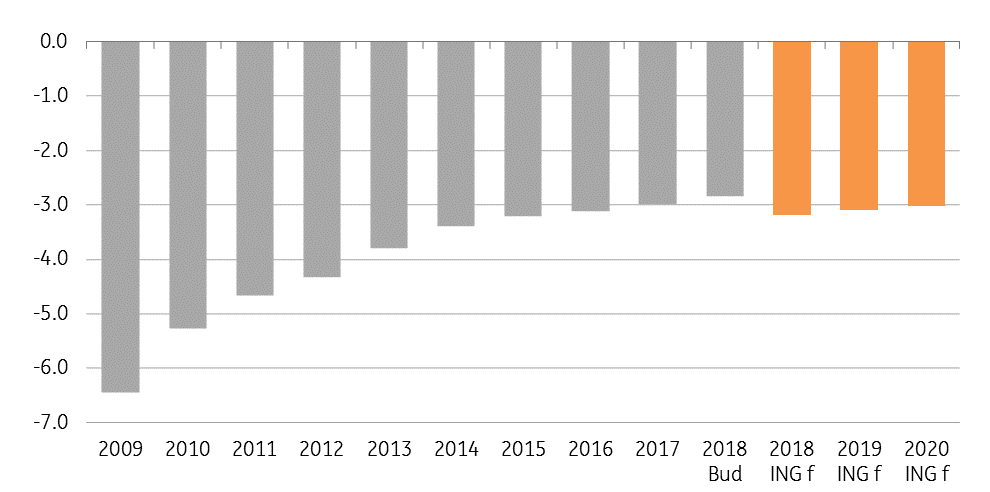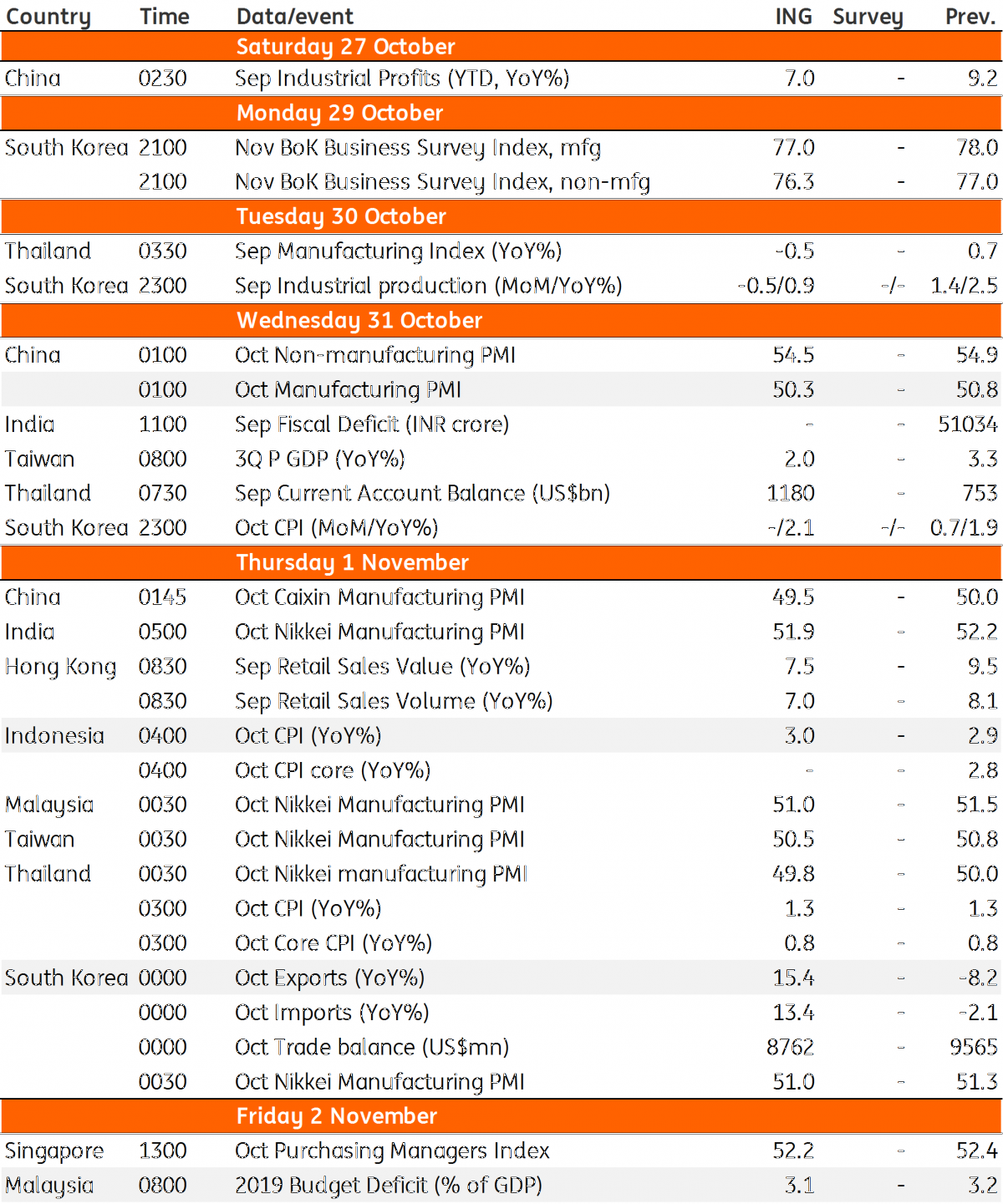Asia week ahead: Malaysia to unveil budget for 2019
A flood of activity data is likely to keep the markets on its toes amid intensified global risk aversion. However, the main highlight of the week will be Malaysia’s budget for 2019, which will see a decade-long fiscal consolidation trend being snapped
| 3.2% |
Malaysia fiscal deficit in 2018ING forecast - percent of GDP |
Malaysia 2019 budget – a balancing act
Malaysia’s finance minister Lim Guan Eng will present the 2019 budget to the parliament on 2 November - the first budget of the new Pakatan Harapan [Alliance of Hope] government. The Mid-term review of the 11th Malaysia Plan 2016-2020 unveiled by Prime Minister Mahathir earlier this month sets a clear tone for the upcoming budget - a deferred fiscal consolidation.
Sweeping policy changes under the government’s drive to improve peoples’ standard of living and clean the corrupt political machinery have strained public finances. The revenue loss from consumer tax reforms is unlikely to be pared by savings from suspending development projects undertaken by the previous government. This comes as overall economic performance continues to weaken and thereby depress government revenue. These factors are likely to push the budget deficit above 3% of GDP in the current year, marking an end to the decade-long fiscal consolidation trend.
We anticipate the deficit to rise to 3.2% in 2018, surpassing the 2.8% initial target and 3.0% in 2017
The tighter policy stance combined with sustained external risk suggests Malaysia’s GDP growth will remain under pressure in 2019, more likely staying close to the low end of 4.5-5.5% target. And with the pressure to trim public debt, estimated over MYR 1 trillion (80% of GDP), getting the fiscal situation under control will be a challenging task in the near-term. We expect only a slight reduction in the deficit to 3.1% of GDP in 2019.
The downside risk to our budget deficit forecasts stems from a significant reduction in development spending, though that also means a greater downside GDP growth risk. Hopes also rest on higher oil price providing positive terms of trade shock to Malaysia's net oil exporting economy. Higher oil price will not only soften the impact of the global trade war, but it also will increase the petroleum revenue to the government. However, it also means higher government expenditure on fuel subsidies to the public.
End of Malaysia's fiscal consolidation trend - deficit as percent of GDP

Likely weak start to Asian economies in 4Q18
Elsewhere in Asia, the week is packed with October economic data on trade, manufacturing, and inflation, which will provide a sense on the region’s performance coming into the final quarter of the year.
China’s PMI will be released this week and will be closely watched for what they say about the trade war impact, though the seasonal slack in activity due to the Golden Week holiday distorts the picture. We expect the manufacturing index to drop 50.3 in October from 50.8 in September. The manufacturing PMI’s from the rest of Asia are expected to show some softness as well.
Korea’s October exports, the first export data for the month from Asia (and probably from the world), will also be pursued for the trade war impact. Don’t be misled by our strong, 15% year-on-year export growth forecast. It’s merely a hope of some clawback of the weakness in the previous two months, while the positive base effects boost the year-on-year growth print. Korea has been a leading Asian economy in export slowdown this year, prompting yet another cut to the central bank’s growth outlook for this and next year.
Indonesia's CPI release is an important one from the central bank's policy perspective after their decision this week to pause tightening. We don’t think a slight uptick in inflation to 3% from 2.9% will be a big deal. With currency stability remaining the key policy driver, we don’t think their tightening cycle is over just yet. We have pencilled in one more 25bp policy rate hike before the end of the year.
Asia Economic Calendar

Download
Download article26 October 2018
Our view on next week’s key events This bundle contains {bundle_entries}{/bundle_entries} articles"THINK Outside" is a collection of specially commissioned content from third-party sources, such as economic think-tanks and academic institutions, that ING deems reliable and from non-research departments within ING. ING Bank N.V. ("ING") uses these sources to expand the range of opinions you can find on the THINK website. Some of these sources are not the property of or managed by ING, and therefore ING cannot always guarantee the correctness, completeness, actuality and quality of such sources, nor the availability at any given time of the data and information provided, and ING cannot accept any liability in this respect, insofar as this is permissible pursuant to the applicable laws and regulations.
This publication does not necessarily reflect the ING house view. This publication has been prepared solely for information purposes without regard to any particular user's investment objectives, financial situation, or means. The information in the publication is not an investment recommendation and it is not investment, legal or tax advice or an offer or solicitation to purchase or sell any financial instrument. Reasonable care has been taken to ensure that this publication is not untrue or misleading when published, but ING does not represent that it is accurate or complete. ING does not accept any liability for any direct, indirect or consequential loss arising from any use of this publication. Unless otherwise stated, any views, forecasts, or estimates are solely those of the author(s), as of the date of the publication and are subject to change without notice.
The distribution of this publication may be restricted by law or regulation in different jurisdictions and persons into whose possession this publication comes should inform themselves about, and observe, such restrictions.
Copyright and database rights protection exists in this report and it may not be reproduced, distributed or published by any person for any purpose without the prior express consent of ING. All rights are reserved.
ING Bank N.V. is authorised by the Dutch Central Bank and supervised by the European Central Bank (ECB), the Dutch Central Bank (DNB) and the Dutch Authority for the Financial Markets (AFM). ING Bank N.V. is incorporated in the Netherlands (Trade Register no. 33031431 Amsterdam).
